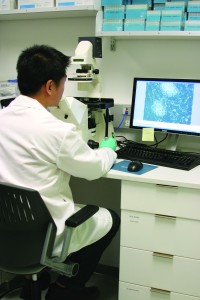Federal grants help Keck promote health
USC’s Keck School of Medicine isn’t scared by the fierce competition for federal research grants.
In 2010, Keck experienced a dramatic jump in funding — more than $33 million — from the National Institutes of Health, which allowed for the average research funding per faculty to jump by more than $20,000, from $121,000 per faculty member to $144,000. This also improved Keck’s ranking in US News & World Report’s list of best medical schools from No. 39 to No. 34.
Elizabeth Fini, vice dean for research at Keck, said research is now a top priority for the school, in part thanks to the efforts of Keck Dean Carmen Puliafito, Provost Elizabeth Garrett and President C. L. Max Nikias.
“Keck School faculty members are experiencing new success in competition for large team grants,” Fini said. “Recent aggressive recruitment of star research leaders is part of the reason for this change to a ‘themes, teams and centers’
approach.”
Part of Keck’s success can be attributed to its participation in the competition for NIH grants as part of the American Recovery & Reinvestment Act, also known as the federal economic stimulus. According to Fini, the Recovery Act has a much more rapid time line for grant submission — normally the process can take up to three years — which is why Keck saw such a drastic increase in rankings and federal funding in just one year.
In the short term, Keck’s jump will allow the school to invest in its infrastructure.
“The result will be a brand new animal care and use facility in the magnificent Broad [California Institute for Regenerative Medicine] Center, scheduled to open in the fall,” Fini said. “It is expected that such leveraging will enable us to sustain a steady level of growth in the long term, with an accompanying climb in the rankings.”
Many of the programs at Keck pulling in a significant portion of funding are ones that could make the greatest impact on human health, according to Fini. Research programs in cancer, emerging and global pathogens, and global health have been among some of the most successful at earning funding in recent years.
The USC Institute for Global Health, which aims to provide world health leaders with the information necessary to deal with global disability and disease, is among the programs that have experienced substantial growth lately.
Ivette Flores Guintu, program manager for the Institute, said research being done there is extremely relevant to the USC community.
“Being in L.A., we deal with a global population every single day,” Guintu said. “We have a really important role to play as globalization becomes a more prevalent focus in everything we do.”
Guintu said the Institute recently began developing an online video game intended to raise awareness of the importance of alliances among non-governmental organizations, the community and the government to improve global nutrition.
“The game will hopefully develop into something broader and on a bigger scale for social impact and change,” Guintu said.
Fini said Puliafito has made translational research, or research designed to shorten the time it takes for a lab discovery to be applied to a patient an extremely high priority.
“We are seeing more basic researchers doing applied studies, as well as more clinician-scientists and clinician-researchers as well,” she said.
Fini explained this relationship can be extended when the Keck School clinical faculty members see patients who are in USC Hospitals and then bring their research findings to their patients.
“We are all a team with a common goal to improve health,” she said.

